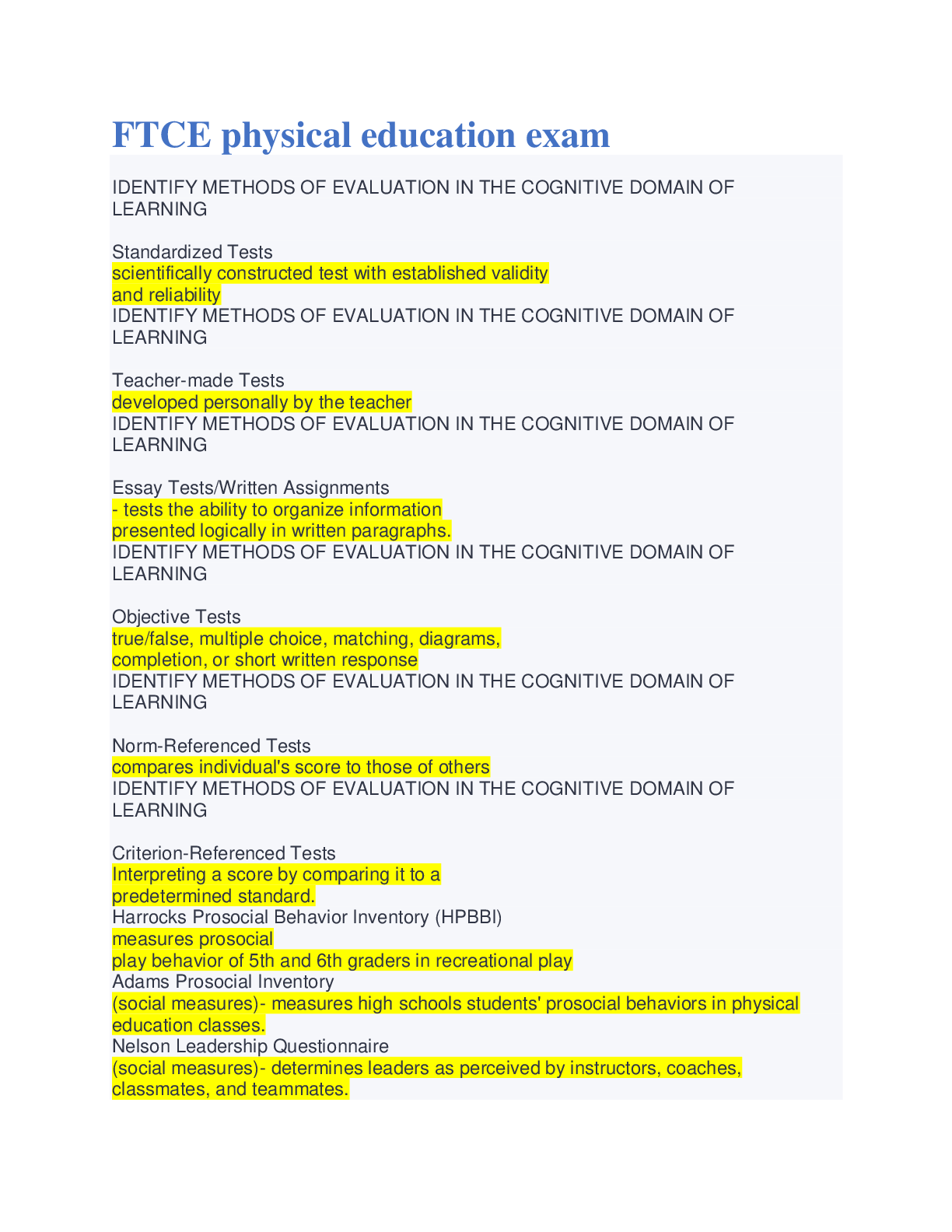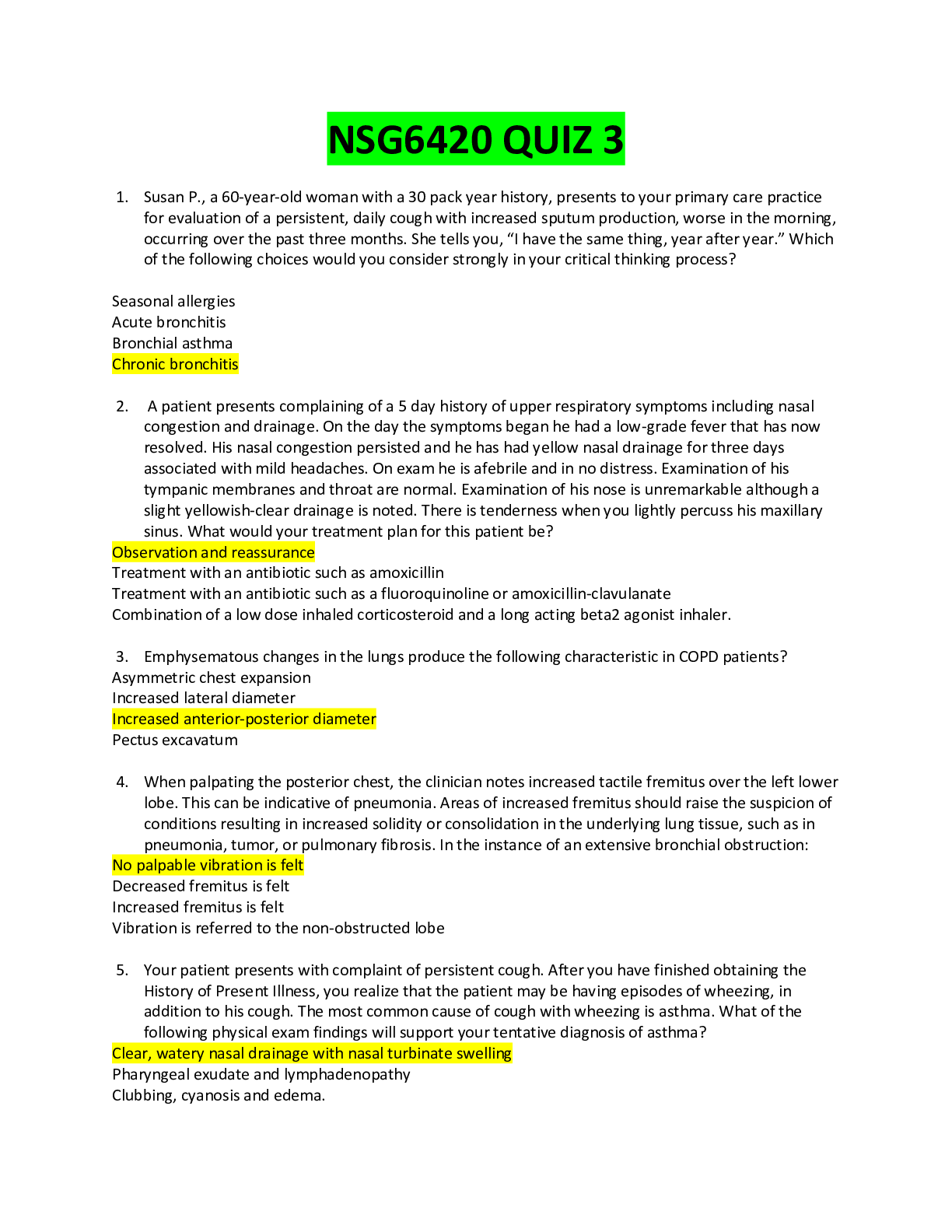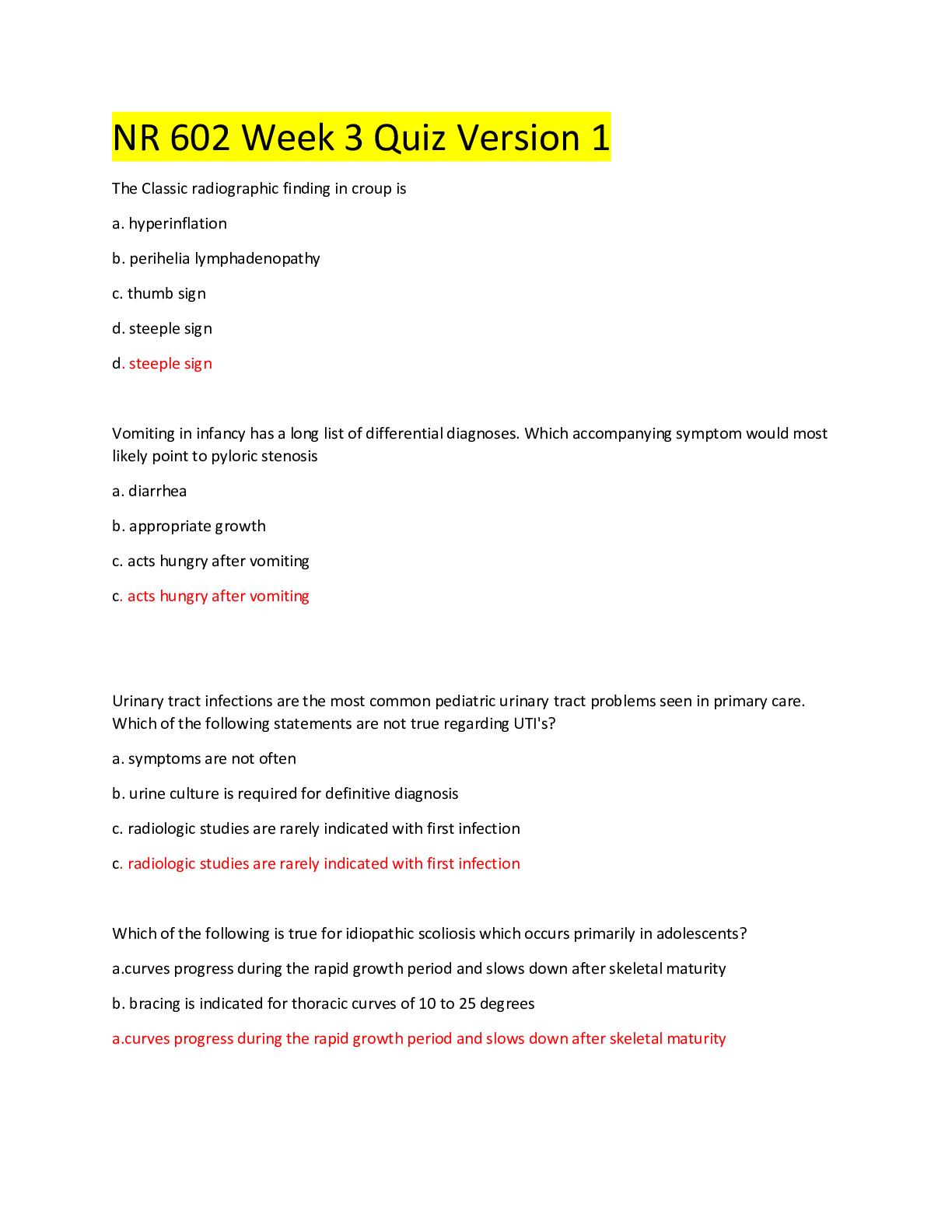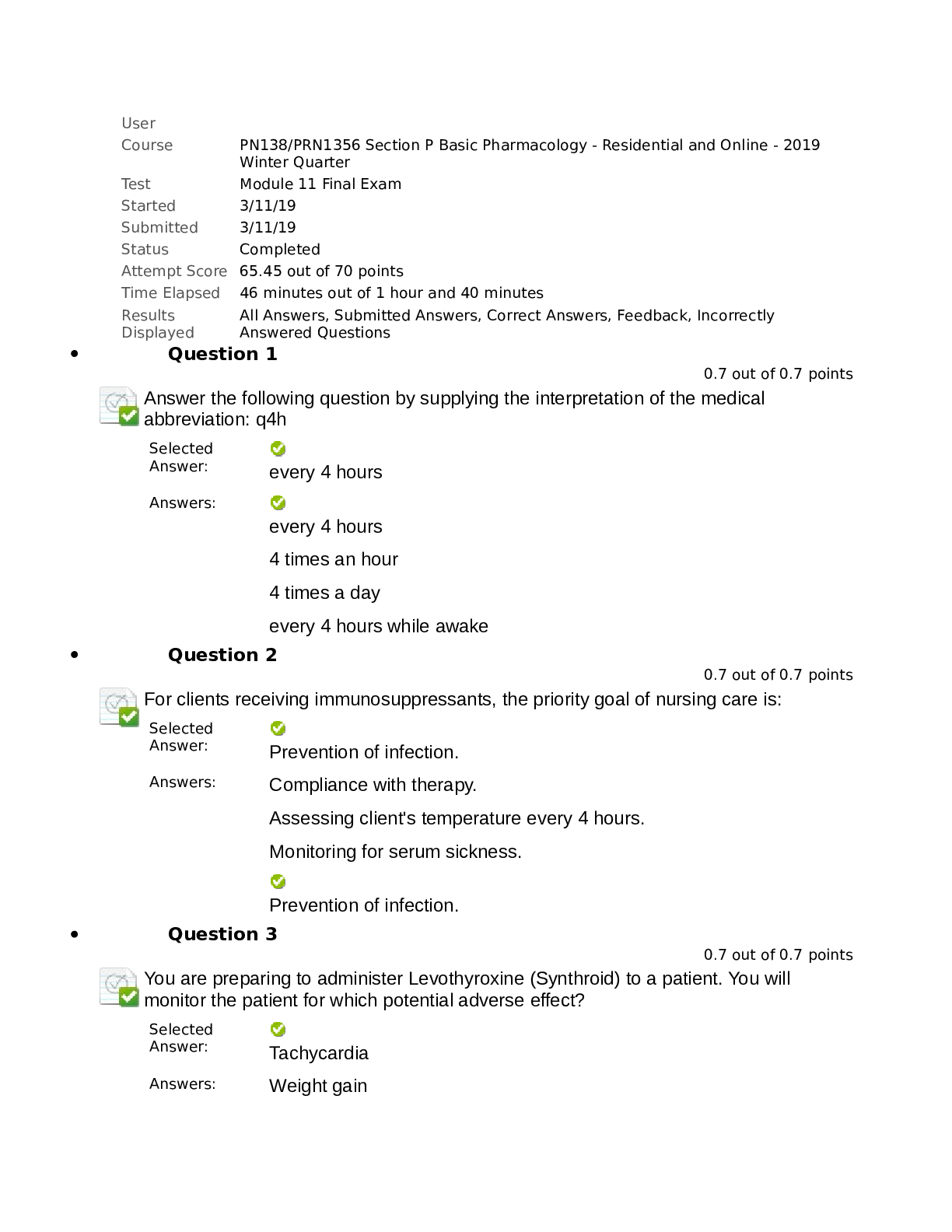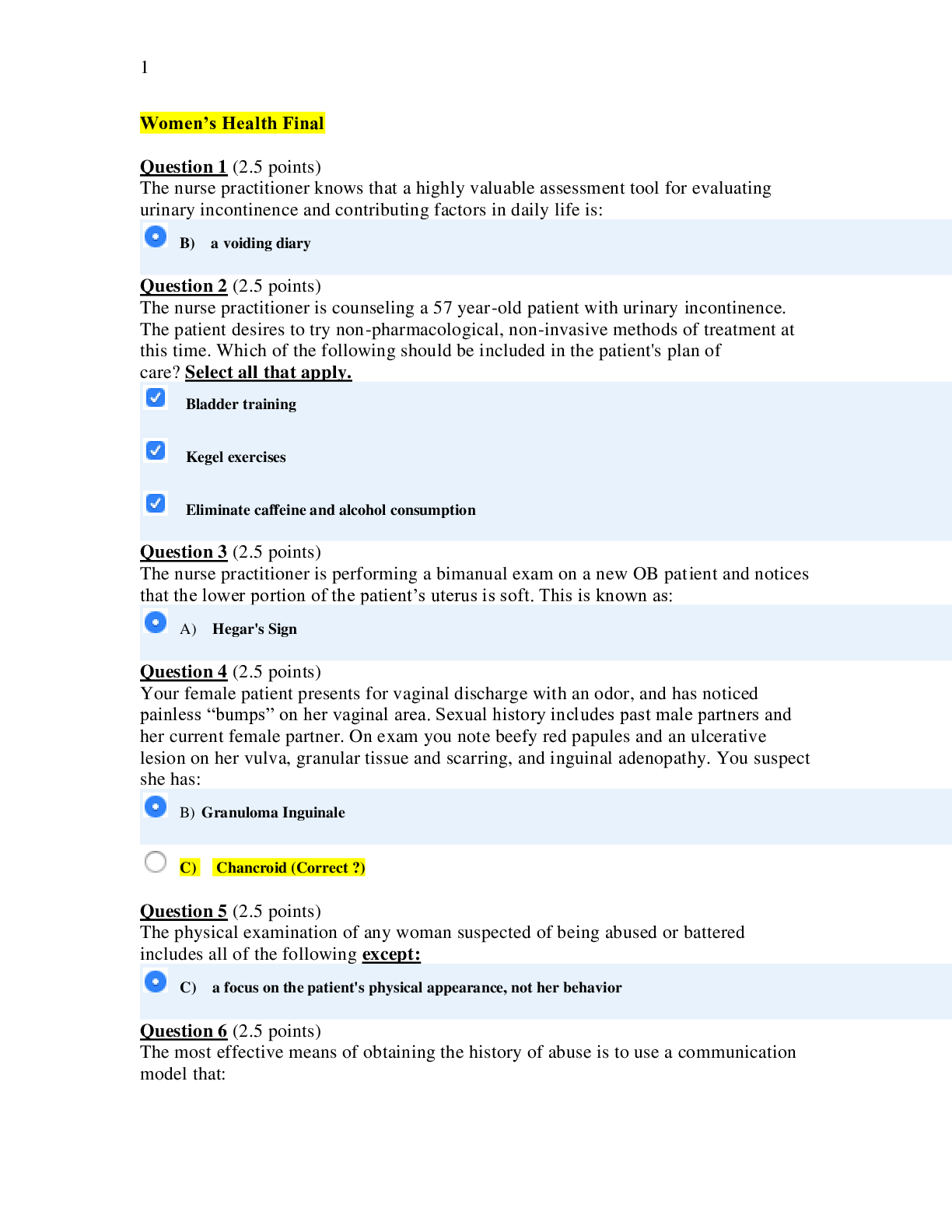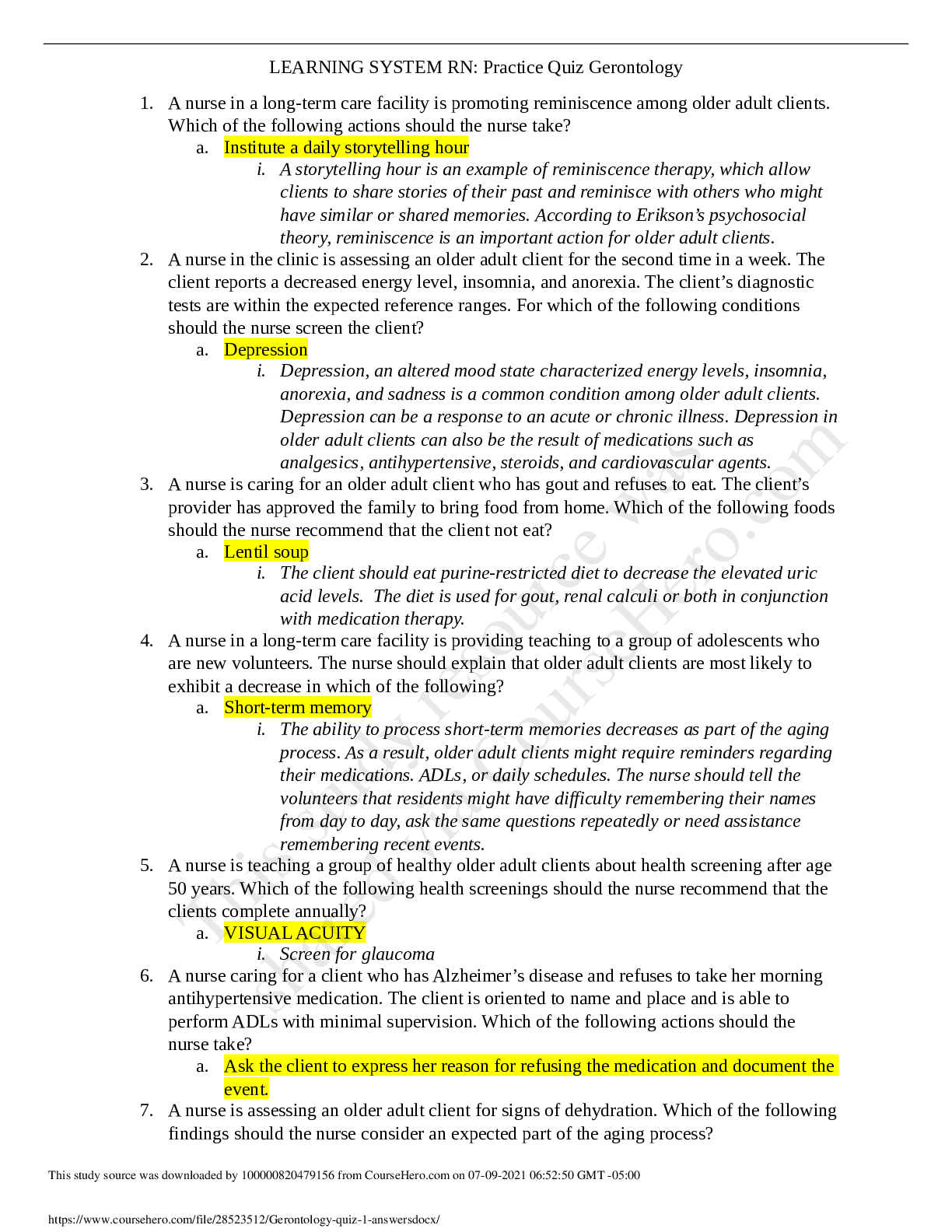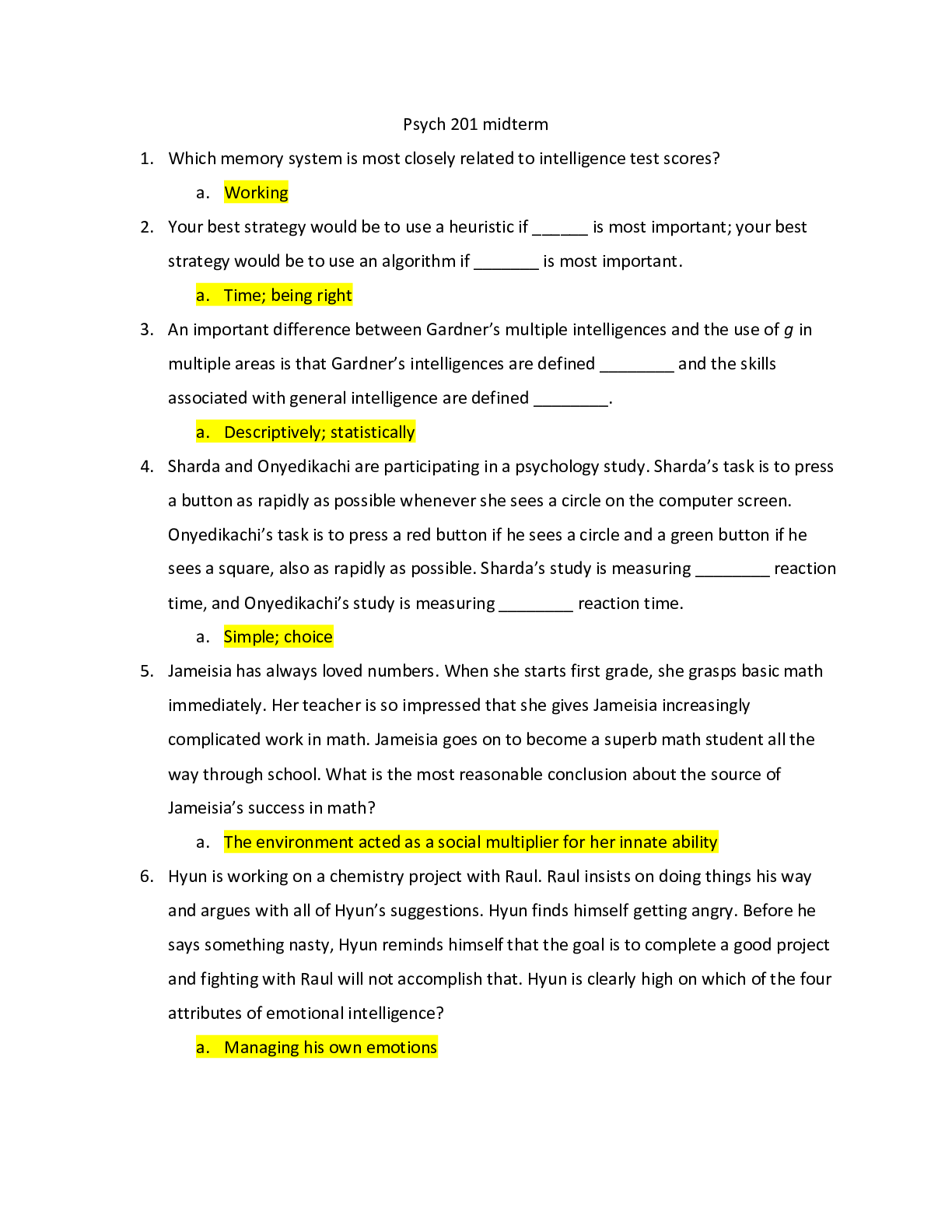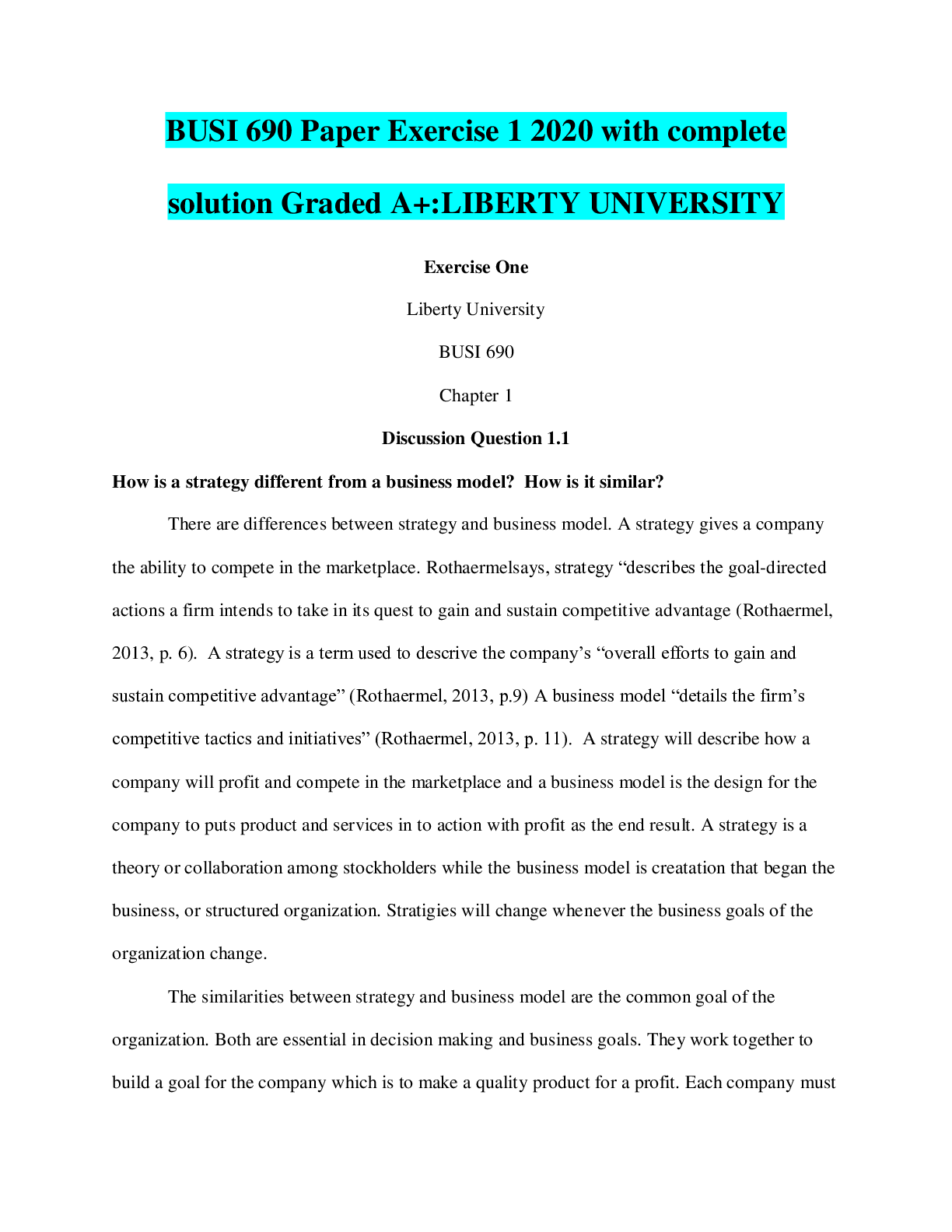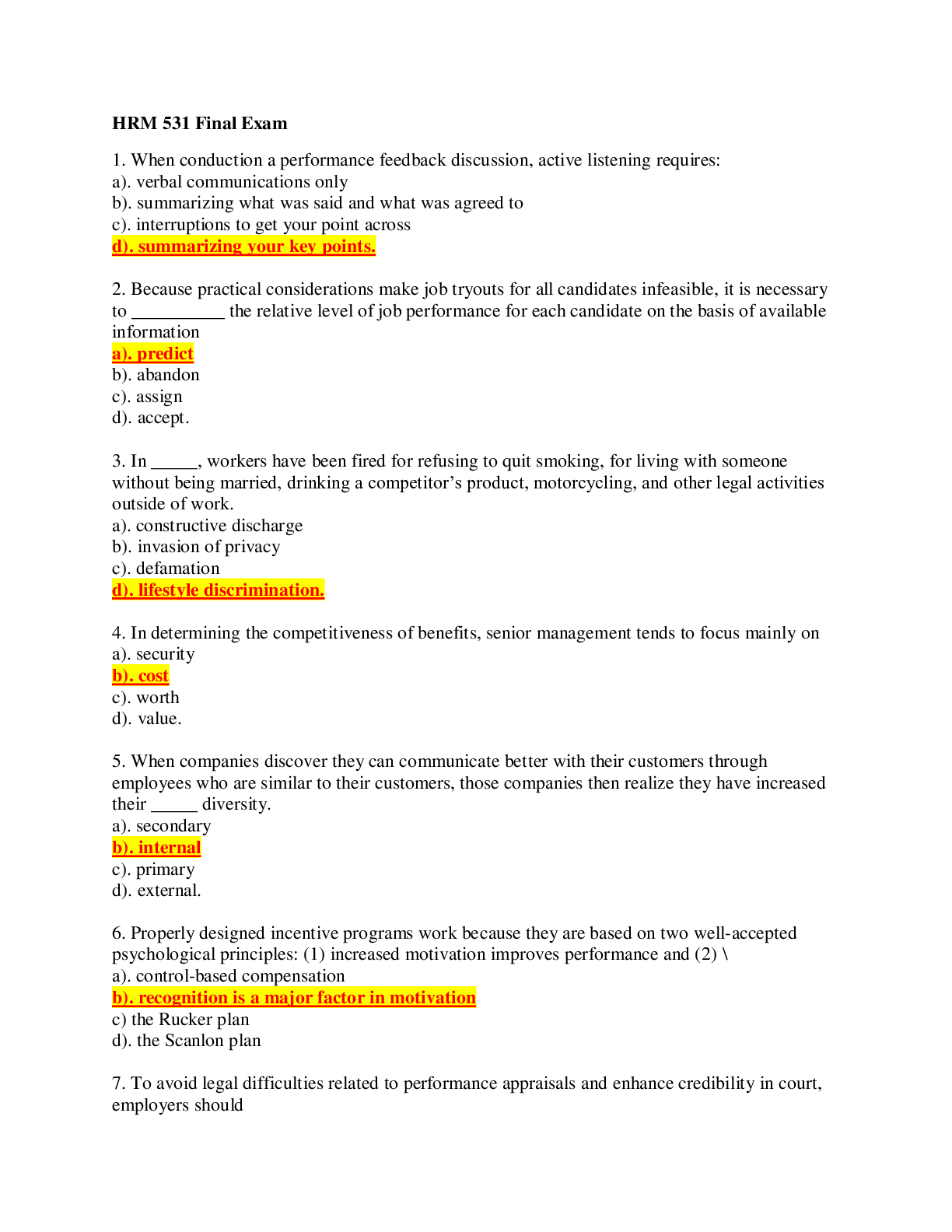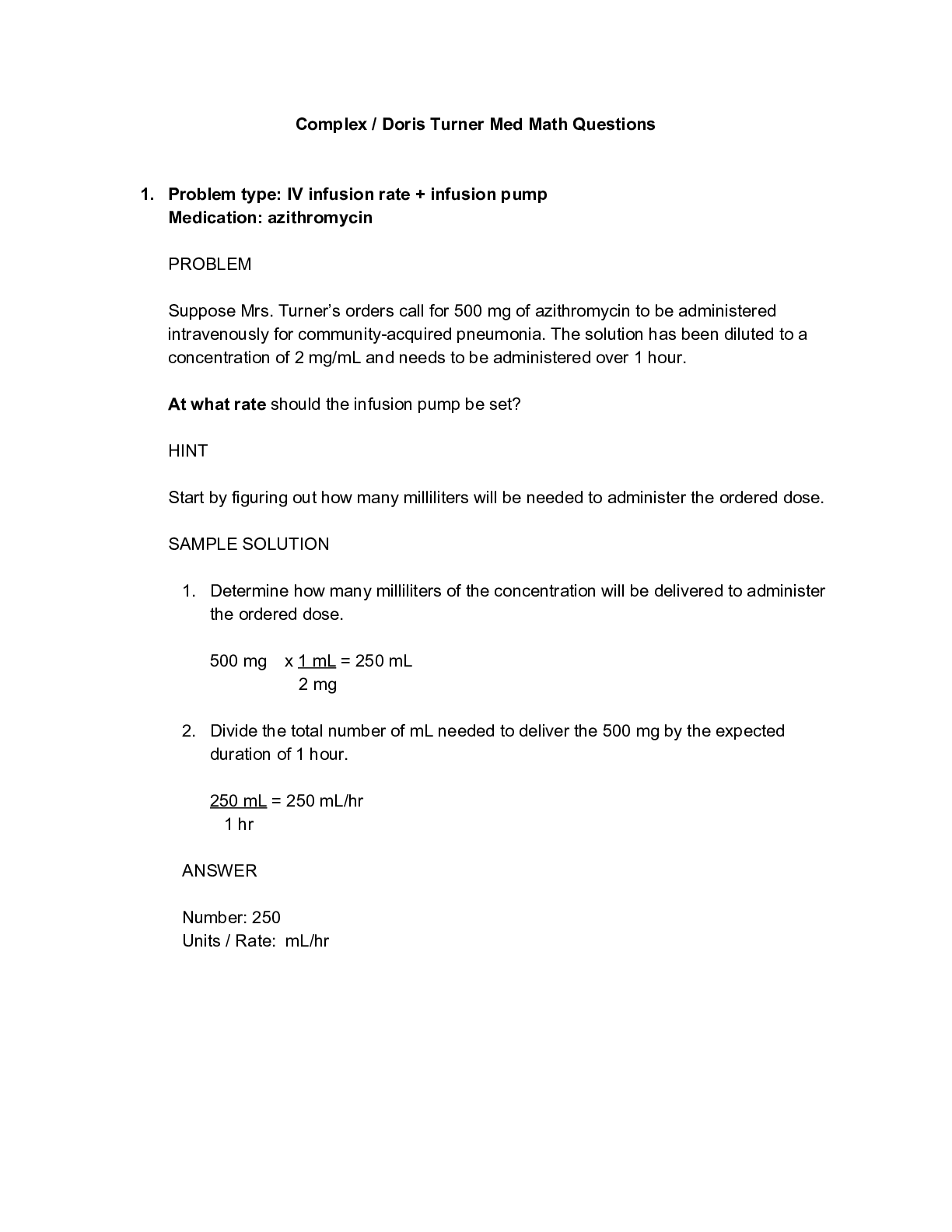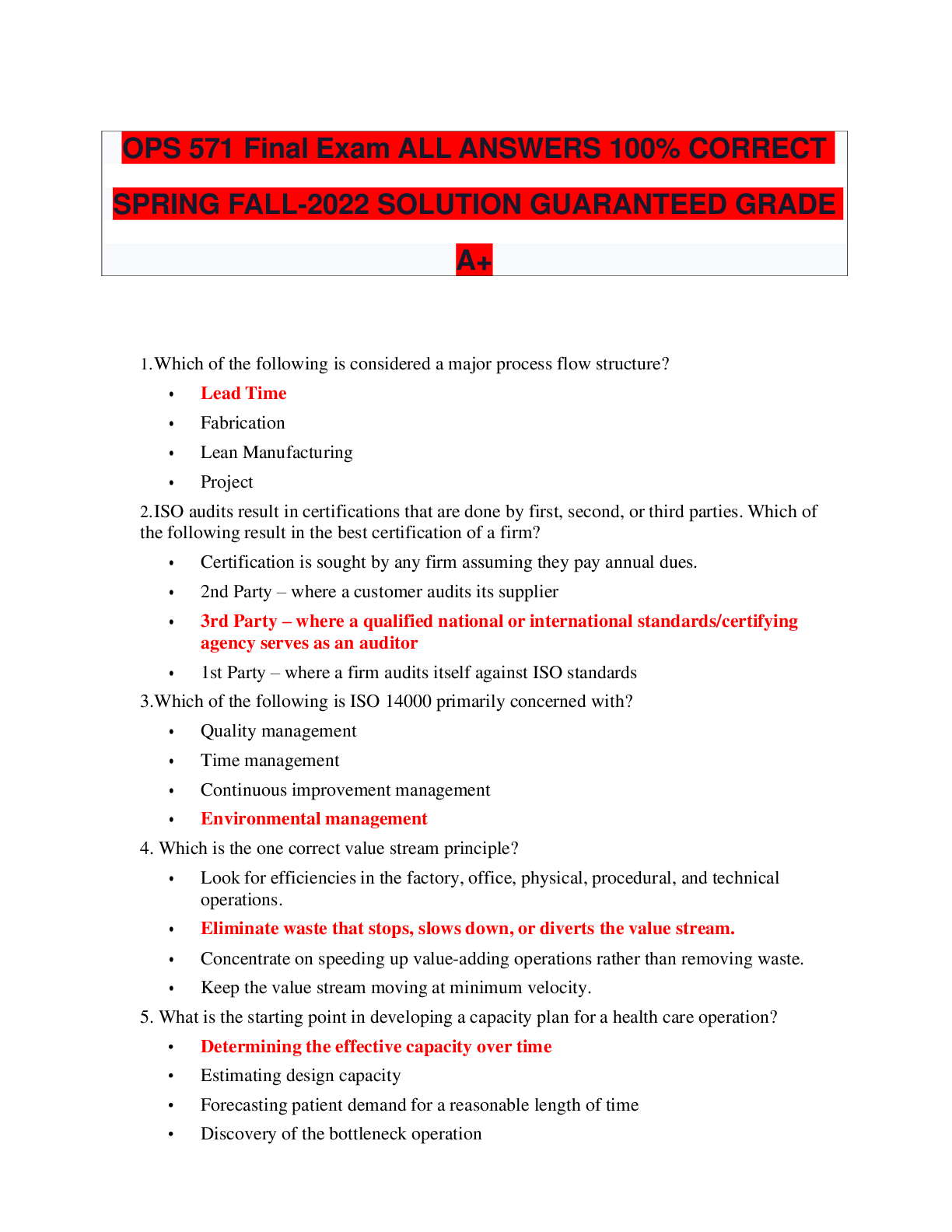Health Care > EXAM > ANCC PMHNP CHPT 2 QUESTIONS WITH COMPLETE SOLUTION (All)
ANCC PMHNP CHPT 2 QUESTIONS WITH COMPLETE SOLUTION
Document Content and Description Below
ANCC PMHNP CHPT 2 NURSE PRACTITIONER ADVANCED PRACTICE CORE CONTENT correct Answer: NURSE PRACTITIONER ADVANCED PRACTICE CORE CONTENT All nurse practitioners upon graduation are expected to meet... a set of core competencies (National Organization of Nurse Practitioner Faculties [NONPF], 2014). Specialty competencies, such as the Psychiatric-Mental Health Nurse Practitioner Competencies, are then built upon these core competencies (NONPF, 2013). Nurse Practitioner Core Competencies * Scientific Foundations *Leadership *Quality *Practice Inquiry *Technology and Information Literacy *Policy *Health Delivery System *Ethics *Independent Practice Leadership Competencies correct Answer: Leadership Competencies Participates in community and population-focused programs that evaluate programs and promote mental health and prevent or reduce risk of mental health problems Advocates for complex client and family medicolegal rights and issues Collaborates with interprofessional colleagues about advocacy, policy to reduce health disparities and improve outcomes for populations Quality Competencies correct Answer: Quality Competencies Evaluates the appropriate uses of seclusion and restraints in the care process Policy Competencies correct Answer: Policy Competencies Employs opportunities to influence health policy to reduce the impact of stigma on services for prevention and treatment of mental health problems and psychiatric disorders Independent Practice Competencies correct Answer: Independent Practice Competencies Develops age-appropriate treatment plans Includes differential diagnosis Assesses impact of acute and chronic medical problems on psychiatric treatment Conducts individual and group psychotherapy Applies supportive psychodynamic, cognitive, behavioral, and other evidence-based psychotherapies to brief and long-term practice Applies recovery-oriented principles Demonstrates best practices of family care approaches Plans care to minimize the development of complications and promote function Treats acute and chronic psychiatric disorders and problems Safely prescribes pharmacologic agents Ensures client safety through the appropriate prescription of pharmacologic and nonpharmacologic interventions Explains the risks and benefits of treatment to client and family Identifies the role of PMHNP in risk mitigation strategies in areas of opiate use and substance abuse Seeks consultation Uses self-reflection to improve care Provides consultation to healthcare providers and others to enhance quality and cost Guides the client in evaluating the appropriate use of complementary and alternative treatment Uses individualized outcome measure to evaluate psychiatric care Manages psychiatric emergencies Refers clients appropriately Facilitates the transition of clients across levels of care Uses outcomes to evaluate care Attends to the client-NP relationship as a vehicle for change Maintains a therapeutic relationship over time with individuals and groups Therapeutically concludes the client-NP relationship Demonstrates ability to address sexual and physical abuse, substance abuse, sexuality, and spiritual conflicts Applies therapeutic relationship strategies based on theory and research Applies principles of self-efficacy, empowerment, and others to effect change Identifies and maintains professional boundaries Teaches clients, families, and groups Provides psychoeducation Modifies the treatment approach based on client readiness Considers motivation and readiness to improve self-care Demonstrates knowledge of appropriate use of seclusion and restraint Documents appropriate use of seclusion and restraint HISTORY OF THE NP ROLE correct Answer: HISTORY OF THE NP ROLE The NP role was introduced in 1965 by Loretta C. Ford, EdD, and Henry K. Silver, MD, at the University of Colorado (Mirr Jansen & Zwygart-Stauffacher, 2006). They identified new roles in which experienced registered nurses (RNs) with advanced education and skills were performing clinical duties traditionally reserved for physicians. Universities were slow to implement NP programs at the master's level. However, RNs embraced the new role and rushed into continuing education programs of varying length, quality, and focus to accomplish the necessary educational preparation for this new role. In 2008 the License, Accreditation, Certification, and Education (LACE) consensus model was finalized and adopted by many nursing organizations. The consensus model identified four Advanced Practice Registered Nurse roles: Certified Registered Nurse Anesthetist (CRNA), Certified Nurse Midwife (CNM), Clinical Nurse Specialist (CNS), and Certified Nurse Practitioner (CNP). As part of the LACE model, Psychiatric-Mental Health was identified as a population focus. The American Psychiatric Nurses Association (APNA) and International Society of Psychiatric Nurses (ISPN) recommendation was for psychiatric-mental health nurse practitioners (PMHNPs) to be prepared across the life span (APNA, 2011). As of 2015 APRNs in psychiatric-mental health nursing have one certification examination, PMHNP-Life Span, with the American Nurses Credentialing Center (ANCC, 2015). All previous psychiatric-mental health advanced practice certification examinations have been retired as of December 2015 (ANCC, 2015). Proven competence brought an acceptance of the NP role in the healthcare system, with acceptance and recognition of the title and role by consumers and other health professionals. NP programs are accredited by one of two organizations to achieve standardization and control over quality: the Commission on Collegiate Nursing Education (CCNE, 2016) and the Accreditation Commission for Education in Nursing (ACEN, 2016). NPs are recognized providers under many third-party insurance coverage plans (e.g., Medicare, Medicaid, CHAMPUS, federal programs funding school-based clinics, U.S. [Show More]
Last updated: 2 years ago
Preview 1 out of 17 pages

Buy this document to get the full access instantly
Instant Download Access after purchase
Buy NowInstant download
We Accept:

Reviews( 0 )
$10.00
Can't find what you want? Try our AI powered Search
Document information
Connected school, study & course
About the document
Uploaded On
Jul 04, 2022
Number of pages
17
Written in
Additional information
This document has been written for:
Uploaded
Jul 04, 2022
Downloads
0
Views
44












